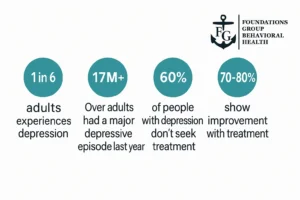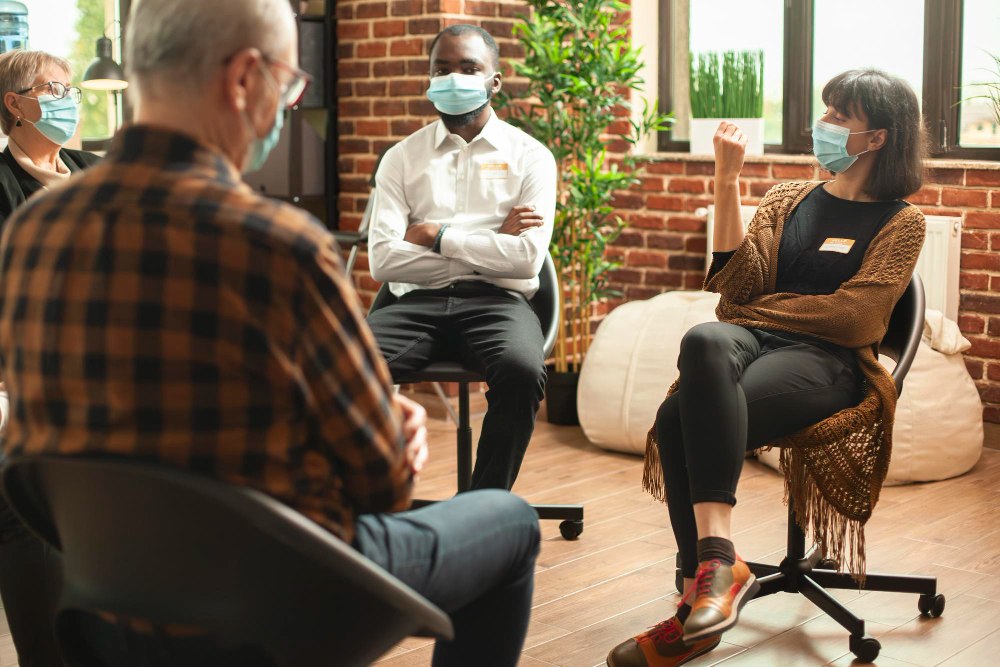You don’t have to feel ready. Just real.
If you’re here, it probably took a lot to get to this point. You might still be unsure. Maybe afraid of being judged or told you’re “too much.” But the moment you decide to reach out for depression treatment isn’t a test—it’s a turning point. And it’s quieter, gentler, and more human than you might think.
At Foundations Group Behavioral Health, we know how heavy this step can feel. Here’s what really happens when you take it.
Someone Answers—And They Understand You’re Nervous
The first moment of reaching out can feel like standing on a cliff’s edge. Maybe your heart is racing. Maybe you’ve drafted and deleted the message more than once. That’s okay.
When you call, you won’t get a robot. You won’t be forced to repeat your story to three different people. A real person answers. Someone trained to listen, who knows how hard it is to speak up when you’re hurting.
They won’t rush you. They won’t quiz you. Instead, they’ll guide the conversation in a way that helps you feel safe.
“I didn’t even know how to say ‘I’m depressed’ out loud. The person on the line helped me find the words without rushing me.”
– Outpatient Client, 2023
You’ll Be Met With Curiosity, Not Judgment
Many people fear they’ll be seen as dramatic or weak for asking for help. But at Foundations, we understand depression as a real, heavy condition—not a character flaw.
We ask about:
- How you’ve been coping
- What your days feel like lately
- Sleep, appetite, and focus
- Past experiences with therapy, if any
These questions aren’t about checking boxes—they’re about seeing the full picture of what you’re carrying. Even if you don’t have “answers,” just saying “I don’t know” is enough to get started.
If you’re feeling overwhelmed just imagining this conversation, know this: We’re used to people showing up mid-breakdown, between work calls, or in a whisper. You don’t have to clean up your emotions to be taken seriously.
You’re Not Locked In—You’re Being Invited
The fear of commitment can stop people from even asking questions. “If I reach out, do I have to start treatment right away?” No.
What happens after the call is up to you.
We’ll walk you through options, explain what treatment could look like, and ask if you’d like to continue. If you’re not ready, that’s okay. If you need to think about it or talk to a loved one first, we’ll honor that.
Taking this step isn’t a contract. It’s more like cracking a window in a stuffy room. The air feels different. A little more possible.
We’ll Help You Understand What’s Available (So You’re Not Left Googling Alone)
If you’re like most people, you’ve probably done some late-night scrolling, trying to figure out:
- “Do I need therapy or something more?”
- “What kind of depression treatment actually works?”
- “Will I have to talk in a group? Take medication?”
These are real, important questions—and we’ll walk through them with you. Our team helps you understand what kinds of care exist, what fits your life, and how it all works in practice.
For many clients in Barnstable County or Falmouth, we start by exploring outpatient therapy or structured support through our depression treatment programs in Cape Cod, MA.
You don’t need to know the names of the services. Just be honest about what hurts.
The Logistics Matter—We’ll Handle Those With You
Here’s something we say a lot: The paperwork should never be harder than the healing. So we do our best to make the process clear and manageable.
Once you feel ready, we’ll:
- Verify insurance coverage or discuss self-pay options
- Help you choose dates and times that work
- Answer any lingering questions about what to expect
If your anxiety is already high, even filling out a form can feel paralyzing. That’s why we walk you through it—and explain everything in real words, not clinical ones.
What You Might Feel Right After the Call
Relieved. Raw. Cautiously hopeful. Or honestly—still scared.
There’s no right reaction. But many people feel a subtle shift once they’ve reached out. Not better, not fixed, but less alone.
“I didn’t start treatment that same day. But once I made the call, something changed. I knew I wasn’t just waiting to break anymore.”
– Depression Treatment Client, 2024
This first connection doesn’t erase depression. But it often marks the beginning of something real: momentum, direction, breath.
What Makes Foundations Different for First-Time Seekers
We don’t expect you to show up fearless. In fact, we build our approach around the fact that you probably are scared, exhausted, or unsure.
Here’s what we prioritize:
- Gentle entry: We won’t pressure you into choices you’re not ready for.
- Clarity, not jargon: You’ll understand what’s happening and why.
- Local care with heart: Our team lives and works in the Cape Cod area—we understand the rhythm of this community.
- Whole-person support: We see more than symptoms. We look at stress, history, sleep, relationships, identity—all of it matters.
If you’re searching for depression treatment in Cape Cod, MA, this isn’t a cold system or a distant provider. This is care built for people like you. Quietly strong. Just starting.
Frequently Asked Questions About Starting Depression Treatment
Do I need a formal diagnosis to get started?
No. Many people who begin treatment haven’t been formally diagnosed yet. Our team can help assess whether what you’re experiencing aligns with clinical depression and what support would be most useful.
Will I have to take medication?
Not necessarily. Medication is one option, but it’s never forced. If you’re open to it, we can connect you with a provider who explains things clearly and honors your comfort level. Therapy and lifestyle-focused care can also be incredibly effective on their own.
What if I’m not sure I need treatment?
That uncertainty is common. If your symptoms are affecting your daily life—work, sleep, relationships—it’s worth reaching out. A conversation doesn’t mean commitment; it just gives you more clarity.
Can I start with just one session?
Yes. An initial intake session helps both you and the provider understand your needs. From there, you can decide whether to continue—and how often.
Is treatment confidential?
Absolutely. Your privacy is protected under federal and state law. We’ll always explain what information is shared (e.g., for billing) and what stays completely private.
What if I live in Barnstable County or Falmouth but can’t get to the office?
Depending on your needs, we offer virtual options that still prioritize connection and depth. We’ll help you figure out what’s accessible and effective.
I’ve tried therapy before and didn’t love it. Is this different?
It can be. Treatment isn’t one-size-fits-all. At Foundations, we listen carefully to what didn’t work in the past—and focus on building something that feels more aligned now.
You Deserve Care That Feels Human
Maybe you’ve told yourself you’re not “bad enough” to need help. Or that other people have it worse. Or that asking for support means you’re failing.
None of that is true.
If something inside you is saying, “I can’t keep living like this,”—that’s enough.
You don’t have to collapse before you’re allowed to be cared for. You can take this step just because you’re tired. Just because you want more.
And if you’re searching for depression treatment in Cape Cod, Barnstable County, or Falmouth—we’re here.
Ready to take the first step?
Call 888-685-9730 or visit our Depression Treatment page to learn more about our services in Cape Cod, MA. We’ll meet you with care—not pressure.









